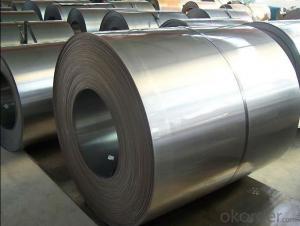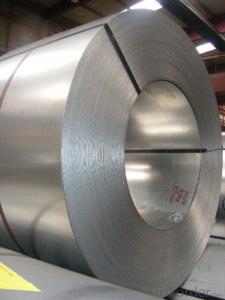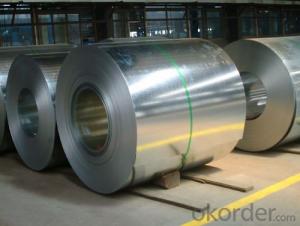Al-Zinc Coated steel rolled coil for roofing
- Loading Port:
- Tianjin
- Payment Terms:
- TT OR LC
- Min Order Qty:
- 25 m.t.
- Supply Capability:
- 30000 m.t./month
OKorder Service Pledge
OKorder Financial Service
You Might Also Like
Structure of Al-Zinc coated steel coil
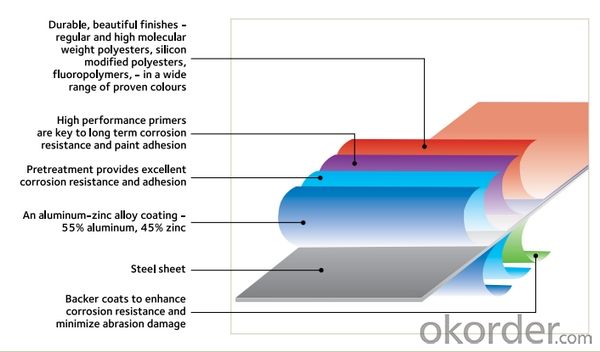
Description of Aluminum Zinc Rolled Coil
The detailed information for the Al-Zinc coated steel coil is as following and it is mainly using for roofing producing, making ceiling grid and all kinds of roll forming structure.
Thickness: 0.20mm to 1.20mm
Width: 914mm, 1000mm, 1200mm, 1219mm and 1250mm, or slit narrow strip according to customer request, can be slit from 20mm to 610mm.
Coil ID: 508mm
Coil weight: 3 tons to 6 tons
Thickness tolerance: +/- 0.02mm or according to customer request.
Main Feature of Al-Zinc coated steel coil
1.Corrosion resistance: It mainly depends on the aluminum protection. When the zinc being worn, the aluminum will form a dense layer of aluminum oxide, resist corrosion material to prevent further corrosion inside.
2. Heat resistance: Aluminum zinc alloy steel sheet has excellent heat resistance, can withstand high temperatures over 300 centigrade, and is similar with aluminized steel high temperature oxidation resistance. It often used in chimney pipes, ovens, fluorescent lighting device and the device cover.
3. Heat reflective: Galvanized steel plate heat-reflective high rate is twice as galvanized steel, often used to make insulation materials.
4. Economy: Because density of 55% AL-Zn is smaller than the density of Zn, so in the same weight and thickness of Galvanized zinc layer, aluminum-zinc steel plate is larger area more than 3% of galvanized steel sheet.
Applications of Al-Zinc coated steel coil
1. Construction and building: roofing; ventilating duct; handrail; partition panel;etc.
2. Electric appliance: refrigerator; washing machine; refrigerator; DVD;etc.
3.Transportation: oil tank; road sign; etc.
4.Agriculture:barn; etc.
5.Others:vending machine; game machine; etc.
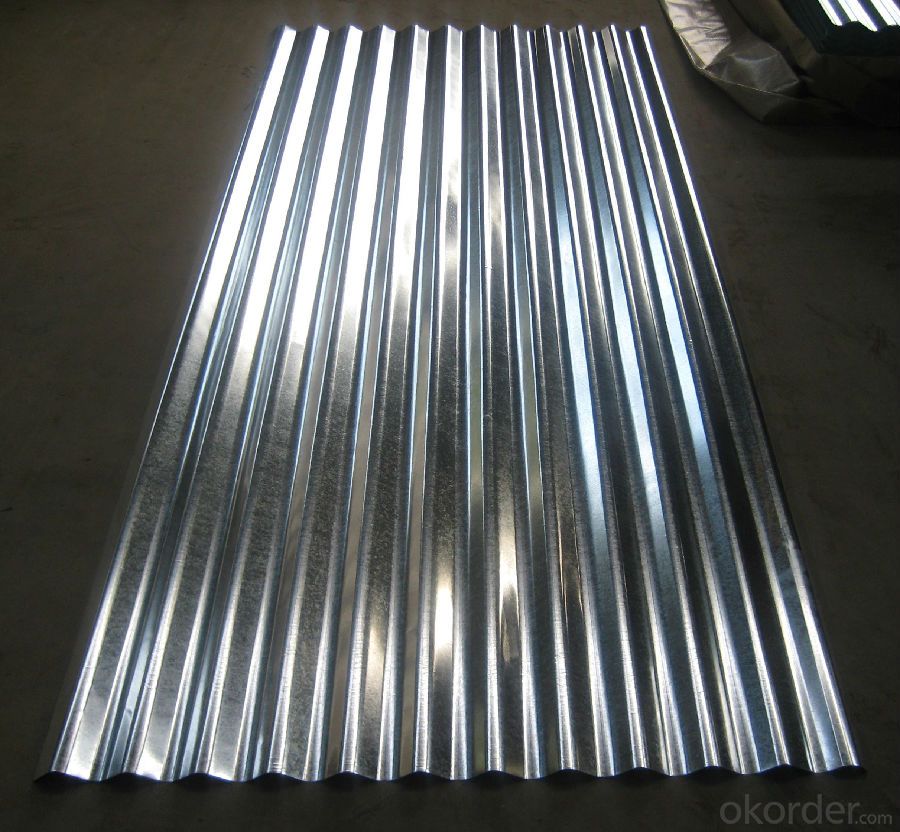
Specifications of Al-Zinc coated steel coil
Prepainted galvanized steel coil ( PPGI ) | Prepainted galvalume steel coil ( PPGL ) | |
Standard | JIS G3312 CGCC | J IS G3322 CGLCC |
Valid thickness | 0. 16 ~1. 2 0mm | 0. 16 ~1. 2 0mm |
Coil width | 600~1250mm | 600~1250mm |
Coil ID | 508mm & 610mm | 508mm & 610mm |
Coil weight | 3~5 tons | 3~5 tons |
Coating | 4 0~275 g/m2 | AZ30 to AZ150 |
Paint t hickness , top side | 15~25 microns | 15~25 microns |
P aint t hickness , reverse | 5~7 microns or 15~25 microns | 5~7 microns or 15~25 microns |
Color | any RAL code | any RAL code |
Package | vertical, eye to sky & horizontal | vertical, eye to sky & horizontal |
MOQ | 25 tons | 25 tons |
FAQ of Al-Zinc coated steel coil
We have organized several common questions for our clients,may help you sincerely:
1. What is the minimum order quantity ?
Our MOQ is 50mt for each size. And we will consider to give more discount if you make big order like 1000 tons and more. Further more, the more appropriate payment term your offer the better price we can provide.
2. How long can we receive the product after purchase?
Usually within thirty working days after receiving buyer’s advance payment or LC. We will arrange the factory manufacturing as soon as possible. The cargo readiness usually takes 15-25 days, but the shipment will depend on the vessel situation.
3. How to guarantee the quality of the products?
We have established the international advanced quality management system,every link from raw material to final product we have strict quality test;We resolutely put an end to unqualified products flowing into the market. At the same time, we will provide necessary follow-up service assurance.
- Q:How are steel coils inspected for thickness variations?
- Steel coils are inspected for thickness variations using non-contact measurement techniques such as laser or ultrasonic sensors. These sensors are capable of accurately detecting and measuring the thickness of the steel coils at various points along their length. The collected data is then analyzed to identify any variations in thickness and ensure the quality and consistency of the steel coils.
- Q:i like stainless steel guns, especially the SW 686 .357, i plan on getting one but my question is would polishing the stainless steel make the gun more prone to corrosion over leaving it as it is? and will the polished surface appear uneven after use and sitting? obviously all metal takes some sort of upkeep but is polished more high maintenance than non-polished?
- I use Mothers Mag polish also. The shine you get depends on the effort.... If you buffed a mirror finish it will dull in time... More work brings it back. On a SW you won't take off enough to make any difference as far as metal holding oil. I use a little Mothers whenever I clean my stainless revolver.... Takes the carbon ring off the cylinder face... I use old cotton socks and t shirts. You could use a Dremel to work the mag wheel polish if you want a bright finish.
- Q:What are the various surface finishes available for steel coils?
- Steel coils offer a range of surface finishes, each with its own properties and uses. Some commonly used finishes include: 1. Hot rolled: Steel is rolled at high temperatures, resulting in a rough surface. This finish is great for structural applications like construction materials and industrial machinery. 2. Cold rolled: Steel is rolled at room temperature, creating a smoother surface. It is commonly used in automotive and appliance manufacturing due to its superior finish and accuracy. 3. Galvanized: Steel is coated with zinc to protect against corrosion. Galvanized coils have a shiny appearance and are suitable for outdoor applications such as roofing and fences. 4. Electro-galvanized: Coated with a thinner layer of zinc through an electroplating process, these coils offer good corrosion resistance. They are commonly used in electrical appliances, automotive parts, and construction. 5. Pre-painted: Coated with paint or polymer film, pre-painted coils provide both corrosion protection and aesthetic appeal. They are extensively used in construction for roofing, cladding, and wall panels. 6. Stainless steel: Stainless steel coils have unique properties, including corrosion resistance, heat resistance, and chemical damage resistance. They are ideal for industries like food processing, medical equipment, and marine applications. These examples showcase the variety of surface finishes available for steel coils. The choice of finish depends on factors such as the intended use, desired appearance, and level of corrosion resistance required.
- Q:Do you know of any movies that featured the steel drum?
- You okorder /.. If I can find any clips, I'll add them, but I'm sure that many movies in the proper settings (Trinidad, etc.) would have such music and/or show a group or at least a single performer. For example, Cool Running could be a possibility.
- Q:What are the common surface defects in steel coils?
- Common surface defects in steel coils include scratches, rust, scale, pits, and stains.
- Q:How do steel coil manufacturers contribute to local economies?
- Steel coil manufacturers contribute to local economies in several ways. Firstly, they create employment opportunities by hiring a significant number of workers, thereby reducing unemployment rates and improving the standard of living in the community. These jobs often include a range of skill levels, from entry-level positions to highly specialized roles, providing a diverse range of employment options for locals. Additionally, steel coil manufacturers contribute to the local economy through their supply chain. They typically rely on local suppliers for raw materials, transportation services, and various support services, fostering business relationships and boosting the local economy. This leads to increased revenue for these suppliers and stimulates economic growth in the region. Moreover, the presence of steel coil manufacturers can attract other businesses to the area, such as logistics companies, distributors, and machine shops, which further enhances the local economy. This expansion of the industrial sector can result in a multiplier effect, generating additional job opportunities and attracting investment from outside the community. Lastly, steel coil manufacturers often engage in corporate social responsibility initiatives, such as supporting local charities, sponsoring community events, or investing in infrastructure development. These contributions not only have a positive social impact but also contribute to the overall economic development and well-being of the local community. In summary, steel coil manufacturers play a crucial role in local economies by creating jobs, stimulating the supply chain, attracting businesses, and investing in community development, all of which contribute to the growth and prosperity of the region.
- Q:How do steel coils contribute to the packaging industry?
- Steel coils play a crucial role in the packaging industry by providing a durable and versatile material for packaging various products. The use of steel coils in packaging ensures the protection and preservation of goods during transportation and storage. One way steel coils contribute to the packaging industry is through their strength and durability. Steel is known for its high strength-to-weight ratio, making it an ideal material for packaging heavy and bulky items. Steel coils can withstand significant pressure and impact, ensuring that goods remain intact and undamaged throughout the supply chain. This strength also allows for the stacking of packages, optimizing storage space and reducing the risk of damage. Furthermore, steel coils are highly resistant to corrosion and moisture. This property is particularly important in the packaging industry as it helps protect goods from environmental factors that could potentially compromise their quality. Steel coils can be coated or treated to enhance their corrosion resistance, ensuring that packaged products remain in pristine condition. Steel coils are also versatile and can be easily customized to suit specific packaging requirements. They can be cut and shaped into various forms, such as sheets, straps, or bands, to secure and protect different types of products. Additionally, steel coils can be easily integrated with other packaging materials, such as cardboard or plastic, to provide added strength and stability. Another benefit of steel coils in the packaging industry is their recyclability. Steel is one of the most recycled materials globally, and steel coils can be easily recycled and reused. This sustainability aspect makes steel coils an environmentally friendly choice for packaging, contributing to the reduction of waste and the conservation of resources. In summary, steel coils play a vital role in the packaging industry by offering strength, durability, corrosion resistance, versatility, and recyclability. Their use ensures the safe transport and storage of goods, providing a reliable and sustainable packaging solution for a wide range of industries.
- Q:How do steel coils compare to aluminum coils?
- Steel coils and aluminum coils have several key differences that make them suitable for different applications. Firstly, steel coils are known for their strength and durability. They can withstand high temperatures and are less prone to damage compared to aluminum coils. This makes steel coils ideal for heavy-duty industrial applications that require robust materials, such as construction, automotive manufacturing, and oil and gas industries. Steel coils are also more resistant to corrosion, making them suitable for outdoor use in harsh environments. On the other hand, aluminum coils are lighter and have a higher strength-to-weight ratio compared to steel coils. This makes them perfect for industries where weight is a critical factor, such as aerospace and transportation. Aluminum coils are also more malleable, allowing for easier shaping and forming, which is advantageous in industries like packaging and consumer electronics. Moreover, aluminum coils have better thermal conductivity than steel coils, which makes them more efficient in heat transfer applications. This property is beneficial in industries like HVAC (heating, ventilation, and air conditioning) and refrigeration, where efficient heat exchange is crucial. In terms of cost, steel coils are generally more affordable compared to aluminum coils due to the lower cost of raw materials. However, aluminum coils can offer long-term cost savings as they require less maintenance and have a longer lifespan due to their resistance to corrosion. In conclusion, the choice between steel coils and aluminum coils depends on the specific requirements of the application. Steel coils are preferred for their strength, durability, and corrosion resistance, while aluminum coils excel in lightweight applications, heat transfer, and malleability.
- Q:When i was 15 i got caught steeling at Super A yes i know i cant believe it. They didnt call the cops or anything they released me to my aunt they took my name and adress and everythimg they said it wouldnt be on my record. But I'm not so sure. Will it be on my record if they didn't call the cops?i live in california. Is there any way i can check my record?
- Steeling? What's that? Did you take a piece of steel and weld it? I am confused?
- Q:I want to know where cold formed steel framing is used, is every steel frame we see in a construction sites like houses, building and bridges cold formed steel frames? or hot formed steel framing?I also read that cold formed steel framing is used for floors, is the steel frame beneath the floor's concrete cover?Thank u very much!!
- It will vary from location to location. A possible way of telling is how the material is joined. If the material is riveted together it is likely cold rolled. If the material is welded then its probably normalized steel (possibly annealed but less likely). Cold rolling increases the yield strength of the material so less of it is needed. However, it also make the material more brittle. Welding creates defects in the region surrounding the weld and these are more likely to grow and cause failure in a cold rolled steel than a normalised or annealed steels. In addition the heat from the welding will change the microstructure that was deliberately introduced by the cold rolling process resulting in a localised drop in yield strength. Normalised and annealed steels are more ductile and tougher than Cold rolled steel but they have a lower yield strength. Because they are tough and ductile they are less sensitive to crakcs and defects so welding won't lead to as big a reduction in strength. Another possible consideration is the environment they are used in. Steels exhibit a transition temperature (actually more like a range) where they go from behaving like a ductile material to a brittle material. A well known example of what this can cause are the Liberty ships in WW2 (Supply vessels from the US to the UK). These were made by welding together sheets of cold rolled steel to form one continuous Hull. Unfortuantely the transiton temperature of the steel taht was sued was around 4 degrees while the Baltic Ocean is about 0 degrees. As a result small cracks would grow and then when the reached a critical size they would tear through the ship at the speed of sound in the metal (1500m/s) and these massive cargo ships would literally snap like twigs. So, if the steel is being used somewhere really cold its unlikely to be Cold rolled too.
1. Manufacturer Overview |
|
|---|---|
| Location | |
| Year Established | |
| Annual Output Value | |
| Main Markets | |
| Company Certifications | |
2. Manufacturer Certificates |
|
|---|---|
| a) Certification Name | |
| Range | |
| Reference | |
| Validity Period | |
3. Manufacturer Capability |
|
|---|---|
| a)Trade Capacity | |
| Nearest Port | |
| Export Percentage | |
| No.of Employees in Trade Department | |
| Language Spoken: | |
| b)Factory Information | |
| Factory Size: | |
| No. of Production Lines | |
| Contract Manufacturing | |
| Product Price Range | |
Send your message to us
Al-Zinc Coated steel rolled coil for roofing
- Loading Port:
- Tianjin
- Payment Terms:
- TT OR LC
- Min Order Qty:
- 25 m.t.
- Supply Capability:
- 30000 m.t./month
OKorder Service Pledge
OKorder Financial Service
Similar products
New products
Hot products
Related keywords
